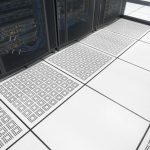Why Raised Floors Are Essential for Data Center Airflow Management
October 5, 2023 3:08 pm Leave your thoughts
1. Improved Air Distribution
One of the primary reasons why raised floors are essential for data center airflow management is their ability to provide improved air distribution. By elevating the floor surface and creating a plenum space underneath, raised floors facilitate the efficient flow of conditioned air to the equipment racks. The cool air can be evenly distributed across the floor, preventing hot spots and ensuring that all equipment receives the necessary cooling. This uniform air distribution helps in maintaining thermal stability within the data center, preventing equipment overheating and potential failures.
2. Flexibility in Cooling Strategies
Raised floors offer data center operators the flexibility to implement various cooling strategies to suit their specific requirements. With the ability to segregate the raised floor into multiple zones, it becomes easier to match cooling capacity with equipment density. For example, in a high-density rack area, more airflow can be directed, while in low-density areas, cooling can be adjusted accordingly. This level of flexibility allows for optimized cooling, reducing energy consumption and improving overall efficiency.
3. Cable Management
The extensive cable infrastructure in data centers requires efficient cable management to ensure proper airflow and reduce the risk of cable damage. Raised floors provide the ideal solution by serving as a hidden space for routing cables. This eliminates the need for overhead cable trays and allows for neat, organized cable management. By keeping the cables away from the airflow pathways, raised floors help in maintaining unobstructed airflow and preventing the accumulation of heat, resulting in a more reliable and efficient data center.
4. Quick and Easy Maintenance
Data centers are dynamic environments that require regular maintenance and upgrades. With raised floors, maintenance becomes relatively simple and straightforward. The access panels in the raised floor system allow for easy access to the underlying infrastructure, including power and data cables. Technicians can quickly and conveniently perform equipment installations, repairs, and upgrades without disrupting the airflow management system. This ease of maintenance ensures minimal downtime and ensures uninterrupted operations within the data center.
5. Enhanced Equipment Reliability
Modern data centers house a wide range of sensitive and expensive equipment that requires consistent and reliable cooling. Raised floors contribute significantly to equipment reliability by providing efficient airflow management. The controlled airflow from the underfloor plenum ensures that the equipment receives adequate cooling, preventing heat-related issues such as equipment failures, shortened lifespan, and performance degradation. By maintaining a consistent and optimal operating environment, raised floors help in extending the lifespan of the equipment and reducing the risk of costly downtime.
6. Future-Proofing the Data Center
Data centers are constantly evolving to meet the increasing demands for computing power and storage capacity. Raised floors offer an element of future-proofing by accommodating changes and expansions in the data center infrastructure. As the layout and equipment requirements change, the raised floor system can be easily reconfigured and modified to suit the new demands. This adaptability allows data center operators to make upgrades and expansions without any major structural changes, saving time and costs while ensuring uninterrupted airflow management.
Conclusion
Raised floors are indispensable for data center airflow management. They provide improved air distribution, flexibility in cooling strategies, efficient cable management, ease of maintenance, enhanced equipment reliability, and future-proofing capabilities. By incorporating raised floors into data center design, operators can ensure optimal operating conditions, reduce energy consumption, extend equipment lifespan, and maintain the performance and reliability of critical IT infrastructure. Ultimately, the use of raised floors is a wise investment that pays off in the form of a more efficient and sustainable data center environment.
Got Questions? Let Us Help!
Categorised in: Raised Floor Systems
This post was written by admin
